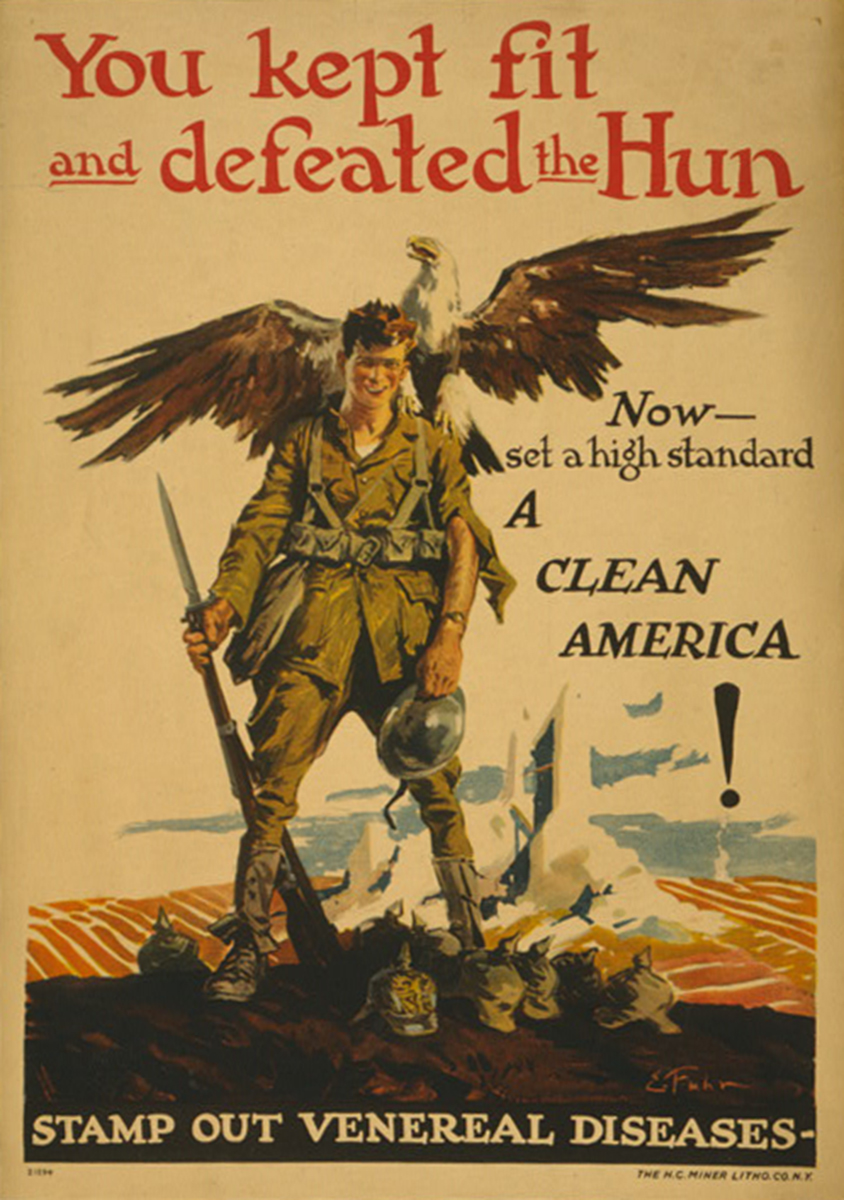Ernest Fuhr, “You Kept Fit and Defeated the Hun—Now Set a High Standard,” c. 1918–1920
Among the posters presented in this unit, this is the only one that targeted soldiers as they went home. Created some time after the war ended in November 1918, the poster urged returning servicemen to take responsibility for preventing the spread of venereal disease in the United States. In the First World War, sexually transmitted infections constituted a major concern for U.S. policymakers and military officials. Away from home and lonely, bored, or looking for a good time, many American servicemen engaged in promiscuous sexual practices from which they contracted syphilis, gonorrhea, and other diseases. In the days before antibiotics, few effective treatments for these ailments existed, and tens of thousands of American soldiers were hospitalized or disabled due to venereal disease. In response to this military and public health crisis, the U.S. Surgeon General and other agencies launched an all-out campaign against venereal disease. They cracked down on prostitution near base camps and organized more “wholesome” forms of entertainment for soldiers. Defying the traditional moral standards of the day, they also discussed venereal diseases and sexuality openly in educational campaigns. In this poster, sexual hygiene campaigners presented the postwar avoidance of sexually transmitted infections as an extension of wartime duty and service, a continuation of a soldier’s commitment to protecting the United States.

Questions
Question
+OA2cQGonyUapkmh+YPW1VwiIsycoLc5UzT13FfZstRw0YaopUxlSkfhQ3A8zhWQixCt1Lspp7xzjPXHDyLUgjcf0VoxziVVqrazUnhJXMt5l7V268Hz+A==Question
a5uObgbBIzvKxZYYcIR2bgWmJIPkm4tBoJ0/9XwFujWLIrGB33Snppk1MLXxcPpOwjPMHxY73FiewP1X8R9Talr+epUpnLTQ/ZH8RdAPAC/4t3OoHNFehAbHQAwbpEpQWdUrfwDVGmZo0btWCqJG9ylQ3mORpe6feqFmBQ==Question
UNsTeiUh9jDvwuRDb3uddAVBamV8vqCwBOVUkfHOtQC5j3jtFzb8N10MfzoQjKAYRDTHPdyXncThDbBfBexhW+8Pm4LM2RFlDHfVxnhhmi6Po++bXv+jdTrbJXN4Rr6RYo16gzdt0Y3doDRL5AMR66YeAemOGVTjZOA+arB7smGi+U9jmTz1+AOSZOrosTOaZmIA0J8OmAXbobN+nuZUSJgANgnlr8ODSgqLpAipA9stLyhCB9U7s2H4g/m6cmKYi6UnVFl9gbiePTha413kEA==